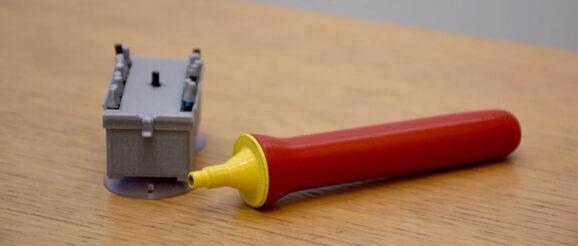Flosser for People with Disabilities Wins Design Innovation in Plastics Award

A clever flossing gadget developed for people who have difficulty using their hands secured Dublin design student Christopher Kenny first place in this year’s Design Innovation in Plastics (DIP) Award.
Inspired by his brother, who has cerebral palsy in his right hand, Kenny invented his “Flossie” device with a specially designed gripping handle. The device uses flossing sticks to help dexterity-challenged users more easily clean their teeth and features components made of ABS, polyurethane, and polypropylene.

“It is a real honor to be recognized in this competition,” Kenny said. “I definitely want to work with materials and mechanisms in the future, as designing for usability really excites me. This project educated me on the constraints around designing plastic components, but also the unique properties that plastics have to offer.”
For winning the 2023 DIP contest, Kenny — in his third year as a product design undergraduate at Technological University Dublin — received an award of £1,000; a placement or course with a DIP sponsor; a year’s membership in the Institute of Materials, Minerals, and Mining; and an invitation to the Lord Mayor’s Banquet as a guest of the Worshipful Company of Horners.
“This is a great product which is inspired by a real-life challenge,” noted Richard Brown, chairman of the judging panel. “We were impressed not just by the clever design, but by the user testing carried out by Chris, to show how it can help people with lifelong conditions that affect movement and co-ordination. He also gave us a detailed analysis of the product manufacturing costs, as well as considering its marketing.”
While the 2023 DIP contest focused on products for the kitchen or bathroom, the 2024 DIP competition theme is “Life Off-Grid: Independently Powered Products.” Contestants “are challenged to create a product that uses its own energy source for an application which is independent of a conventional power supply. [The] product should be self-sufficient, meaning it can operate off-grid, and could utilize energy-harvesting technologies such as solar, wind, tidal, thermal, kinetic, bio, and mechanical.”
